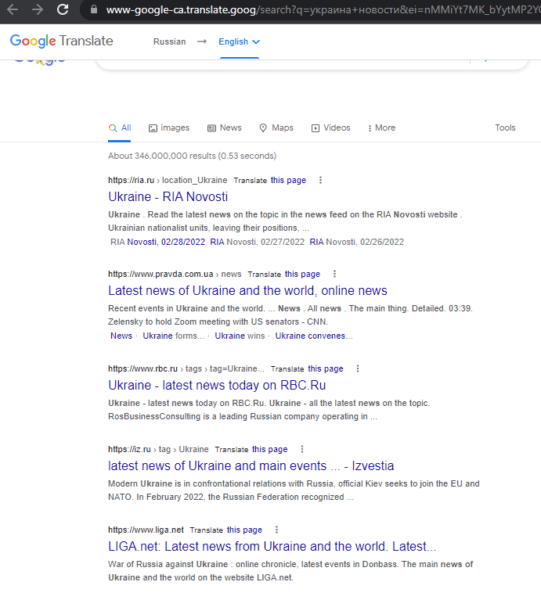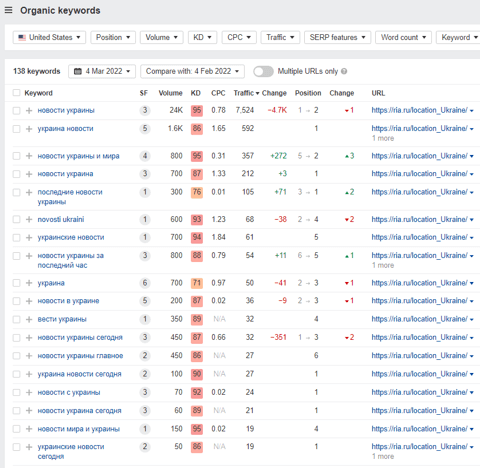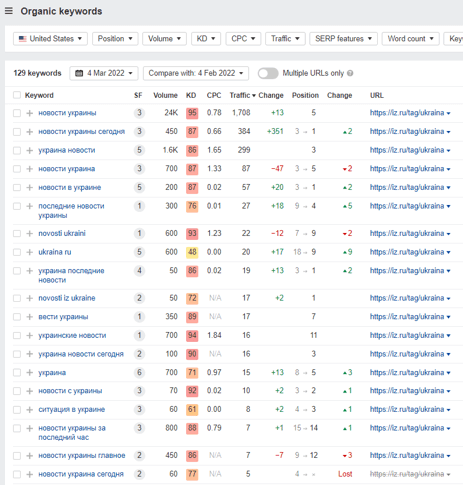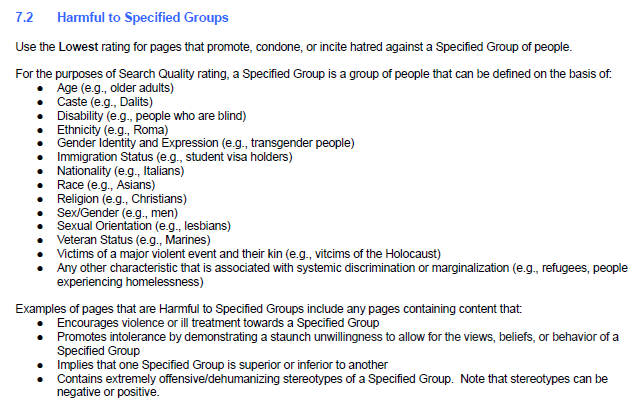Google’s search results for Russian search queries related to Ukraine are almost entirely dominated by a handful of known Russian pro-Putin propaganda publications, such as Izvestia, Russia Today and Ria News.
How is this happening when several credible Ukrainian and Western publications deserving to rank? And how is this happening when Google has stated its commitment to fighting disinformation?
Here’s why Google needs to fix this.
Why Google’s search results matter for Russian speakers
For many Russian language speakers of all ethnicities and nationalities, accessing credible news that’s free from pro-Putin propaganda is difficult – even outside of Russia. And it seems even on Google.
I count myself among this group. I live in Canada and speak Russian. And yet, I was shocked to see publications that broadcast the state-sanctioned narrative ranking so well on Google:


Again, this was just me searching on Google for “Ukraine” results from Canada. Not Russia.
It’s critically important for Russian speakers, many of whom might already find themselves isolated in information bubbles filled with propaganda and conspiracies that justify the war, to have access to accurate, vetted and balanced information about the war when they search for it. That isn’t happening right now.
Sold as a “liberation” and “peace-keeping” mission, the war has a 70% approval rating in Russia. Propaganda fuels a greater ideological divide, with grave consequences.
Russia’s state narratives dominate the Russian web
Russia’s disinformation campaigns are common knowledge. In recent days, western media and tech platforms started scaling back their operations with Russia or cutting ties altogether.
Facebook restricted access to the accounts of Russia’s top media publications, such as Zvijazda, RIA News, Sputnik, Russia Today, Lenta.ru, Gazeta.ru, and others. TikTok is said to have started to remove video content posted to the platform by RIA News, one of Russia’s largest news channels.
One would think that with more than 160 million Russian speakers globally, these restrictions might be a signal to seek better, more credible information elsewhere. But it appears that that “information divide” is also linguistic.
What’s most shocking? Many critical searches related to the events in Ukraine that are executed in Russian on Google return results filled with pro-Putin propaganda.
Among the highest ranking of these publications are RIA News (with more than 1,200 pages indexed for the term “denazification” in Google), Iz.ru, Russia Today, and Ukraina.ru.
Search query comparison: “Ukraine” vs. “United States”
There is a vast difference in the type of ranking content when you compare “Украина” versus “United States.”
An exact match Google search for “Украина” (Ukraine in Russian), returns a SERP where, aside from Wikipedia, almost of the results from Russian news sites. This is surprising, as one would expect more results that provide general information and are from Ukrainian domains.
These are the top 10 URLs that rank in Google’s organic results for the search query “украина” (“ukraine”):

And these are the top 10 results for the search query “United States”:

Search query: “что происходит на украине” (“what is happening in Ukraine”)
This is a less obvious search query, but search volume has risen within the past two weeks. It has also shown up within Google’s related searches and search suggestions. While there is occasional diversity in the video results, the top organic results are RIA, Izvestia and Russia Today.

Search Query: “украина новости” (“ukraine news”)
Search queries related to Ukraine news are beginning to see more Ukrainian sites appear in Google’s SERPs, but three out of the five top results are still Russian sites, including RIA and Izvestia.

A closer look: why are these sites ranking?
Did you notice that the ranking pages from Russia’s news sites have one thing in common? They are archive pages for tags that match “Ukraine,” not content pages. It’s generally an accepted SEO best practice to noindex archive pages. Many other news websites rank well with their journalistic content. But virtually all of the high-ranking Russian news sites have pursued the strategy of deliberate promotion and link building to their archive pages.
The pages from RIA News, Izvestia and Russia Today dominate the space for search queries (as well as variants and misspellings) of “Украина” (Ukraine), “новости украины” (ukraine news), and “что происходит на украине” (what is happening in ukraine). There is no significant difference between SERP positions based on location (Russia, Ukraine or United States).
RIA News
The best performer, RIA News, has a bare-bones archives page that includes article headlines, images, and other tags, and comes across as an internal linking tactic in itself. There are 20 headlines and over 100 links on the page. No other content.

Izvestia
Izvestia is also an archive page, but it contains more content than RIA. While there are no images, the 15 article snippets include headlines and descriptions. There is a right-hand navigation, as well as a header content block with the tag description, in this case, mentioning that modern Kyiv is in “confrontational relations with Russia” as well as the “military special operation aimed at protecting the civilian population of Donbas.” The page loads intermittently but is accessible via the WayBack Machine.

Russia Today
An established entity with a global presence, Russia Today has the look and feel of a quality news site with good UX, large article snippets that include a headline, description, and image, as well as links to additional content in the right-hand menu.

Ukraina.ru
This publication contains a mixture of original content and articles syndicated from other Russian websites. The mission statement that appeared on the site early in its existence, 11 years ago, said that the purpose of the project was to fill the gap in the minds of Russians about Ukraine and to allow Russia to “move West.”
Are there no relevant Ukrainian sites for Google to rank?
Is there any relevant content from Ukrainian sources that could compete with Russian results? Absolutely. Not even counting Russian language sites by BBC, Deutsche Welle and other credible news sources, there are many Ukrainian news websites that publish in the Russian language.
Microsoft Bing is far more inclusive of Ukrainian sites in its SERPs than Google. Five of the top six Bing results for “Ukraine News” (are Ukrainian (either in .ua TLD or owned by Ukrainians and otherwise located outside of .ru TLD).
Shouldn’t YMYL be a factor for Google?
In 2014, to fight disinformation, Google introduced YMYL (Your Money or Your Life) content category to its search quality rater guidelines. YMYL is a term used to describe pages and content that can potentially impact one’s happiness, health, finances, safety and more.
Quality thresholds are considerably higher for this type of content. Google states that “YMYL pages should come from reputable websites, and the content should be created with a high level of expertise and authority.”
According to Google, news publications are expected to measure up high journalistic standards, adhere to clear editorial policies, and present clearly researched, vetted and trustworthy information.
Google’s Search Quality Evaluator Guidelines (September 2019) is very explicit about its instructions for content that is harmful to specified groups (7.2), as well as pages with harmfully misleading information (7.3).


Google needs to clean up its harmful, misleading results
Well, Google, it’s time to hold yourself to the same standards you want media and news publications to meet. It’s time for you to remove the Russian propaganda from your search results. And give Russian language speakers the trustworthy content and information they need.
Opinions expressed in this article are those of the guest author and not necessarily Search Engine Land. Staff authors are listed here.
New on Search Engine Land
https://searchengineland.com/google-russian-propaganda-search-results-382229


